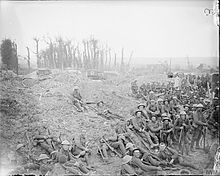41st Division (United Kingdom)
| 41st Division | |
|---|---|
 Formation sign of 41st Division | |
| Active | 1915–1919 |
| Country | |
| Branch | |
| Type | Infantry |
| Size | Division |
| Engagements | First World War * Battle of the Somme * Battle of Messines * Battle of Passchendaele * Hundred Days Offensive |
| Commanders | |
| Notable commanders | Sir Sydney Lawford |
The 41st Division was an infantry division of the British Army, raised during the First World War as part of Lord Kitchener's New Armies. The division saw service on the Western Front and later on the Italian Front.
Formation history

The division was formed as part of the fifth wave (K5) of divisions in the New Army; it did not have a regional title, but was composed primarily of recruits from the south of England. Several of its battalions had been raised by local communities and were named for their towns or industries. After training and home service, the 41st Division, commanded by Major-General Sydney Lawford, deployed overseas to reinforce the British Expeditionary Force (BEF) on the Western Front in the first week of May 1916; its first major combat came in September of that year, at the Battle of Flers–Courcelette, part of the larger Battle of the Somme.[1]

After fighting in 1917 at the Battle of Messines and the Battle of Passchendaele (also known as the Third Battle of Ypres) it was transferred with four other divisions to the Italian Front.[2] It remained here for three months throughout the winter of 1917–18 before returning to the Western Front, where it arrived just before the German Army launched its Spring Offensive in March. It participated in the Allied "Hundred Days Offensive" and ended the war in Flanders, from where it moved to join the Army of Occupation in Germany, following the Armistice of 11 November 1918. The 41st Division was commanded by Major-General Sydney Lawford throughout its existence[3] and was demobilised in March 1919, with some units transferred to the 47th (1/2nd London) Division, British Army of the Rhine (BAOR).[4]
Order of battle
The 41st Division was constituted as follows during the war:[4]
- 12th (Service) Battalion, East Surrey Regiment (Bermondsey)
- 15th (Service) Battalion, Hampshire Regiment (2nd Portsmouth)
- 11th (Service) Battalion, Queen's Own (Royal West Kent Regiment) (Lewisham) (disbanded March 1918)
- 18th (Service) Battalion, King's Royal Rifle Corps (Arts and Crafts)
- 122nd Machine Gun Company (joined May 1916, moved to 41st Battalion Machine Gun Corps (M.G.C.) March 1918)
- 122nd Trench Mortar Battery (joined June 1916)
- 11th (Service) Battalion, Queen's (Royal West Surrey Regiment) (Lambeth)
- 10th (Service) Battalion, Queen's Own (Royal West Kent Regiment) (Kent County)
- 23rd (Service) Battalion, Middlesex Regiment (2nd Football)
- 20th (Service) Battalion, Durham Light Infantry (Wearside) (transferred to 124th Brigade March 1918)
- 123rd Machine Gun Company (joined June 1916, moved to 41st Battalion M.G.C. March 1918)
- 123rd Trench Mortar Battery (joined June 1916)
- 10th (Service) Battalion, Queen's (Royal West Surrey Regiment) (Battersea)
- 26th (Service) Battalion, Royal Fusiliers (Bankers)
- 32nd (Service) Battalion, Royal Fusiliers (East Ham) (disbanded March 1918)
- 21st (Service) Battalion, King's Royal Rifle Corps (Yeoman Rifles) (disbanded March 1918)
- 20th (Service) Battalion, Durham Light Infantry (Wearside) (transferred from 123rd Brigade March 1918)
- 124th Machine Gun Company (joined June 1916, moved to 41st Battalion Machine Gun Corps (M.G.C.) March 1918)
- 124th Trench Mortar Battery (joined June 1916)
Divisional Troops
- 13th (Service) Battalion, East Surrey Regiment (Wandsworth) (left October 1915)
- 23rd (Service) Battalion, Middlesex Regiment (2nd Public Works) ( joined as Divisional Pioneers October 1915)
- 238th Machine Gun Company (joined July 1917, left October 1917)
- 199th Machine Gun Company (joined October 1917, moved to 41st Battalion M.G.C. March 1918)
- 41st Battalion M.G.C. (formed March 1918 absorbing the brigade MG companies)
- Divisional Mounted Troops
- B Squadron, Royal Wiltshire Yeomanry (left 31 May 1916)
- 41st Divisional Cyclist Company, Army Cyclist Corps (left 28 May 1916)
- 41st Divisional Train Army Service Corps
- 296th, 297th, 298th and 299th Companies
- 52nd Mobile Veterinary Section Army Veterinary Corps
- CLXXXIII (Howitzer) Brigade, Royal Field Artillery R.F.A. (broken up November 1916)
- CLXXXVII Brigade, R.F.A.
- CLXXXIX Brigade, R.F.A. (left January 1917)
- CXC Brigade, R.F.A.
- 41st Divisional Ammunition Column (West Ham) R.F.A.
- V.41 Heavy Trench Mortar Battery, R.F.A. (formed July 1916; disbanded October 1917)
- X.41, Y.41 and Z.41 Medium Mortar Batteries, R.F.A. (formed May 1916; in April 1918, Z broken up redistributed among X and Y batteries)
- XIII Belgian Field Artillery Regiment (attached January to May 1917)
- 228th (Barnsley) Field Company
- 233rd (Ripon) Field Company
- 237th (Reading) Company
- 41st Divisional Signals Company
- 138th Field Ambulance
- 139th Field Ambulance
- 140th Field Ambulance
- 84th Sanitary Section (left April 1917)
Notable people associated with the division
- Walter Tull
- Robert Anthony Eden, 1st Earl of Avon, Prime Minister 1955–1957
- Robert Cyril Morton Jenkins British Senior Police Officer
See also
References
- ^ "23rd (2nd Football) Battalion, The Middlesex Regiment (Duke of Cambridge's Own)". Archived from the original on 26 March 2014. Retrieved 4 December 2013.
- ^ Williamson, Howard J.; Bate, Chris (2020). The award of the Military Medal for the campaign in Italy 1917-1918. privately published by Anne Williamson. ISBN 978-1-8739960-5-8.
The book includes: – A detailed overview of the Italian Campaign and its battles. – Notes on the [five] Divisions engaged in Italy.
- ^ 'Douglas Haig: War Diaries & Letters 1914-1918', edited by G. Sheffield & J. Bourne (Pub. Weidenfeld & Nicolson, 2005), pp. 103–104.
- ^ a b Baker, Chris. "41st Division". The Long, Long Trail. Retrieved 24 November 2018.
